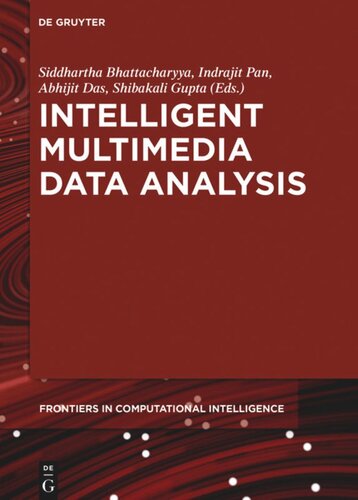

Most ebook files are in PDF format, so you can easily read them using various software such as Foxit Reader or directly on the Google Chrome browser.
Some ebook files are released by publishers in other formats such as .awz, .mobi, .epub, .fb2, etc. You may need to install specific software to read these formats on mobile/PC, such as Calibre.
Please read the tutorial at this link: https://ebookbell.com/faq
We offer FREE conversion to the popular formats you request; however, this may take some time. Therefore, right after payment, please email us, and we will try to provide the service as quickly as possible.
For some exceptional file formats or broken links (if any), please refrain from opening any disputes. Instead, email us first, and we will try to assist within a maximum of 6 hours.
EbookBell Team

4.8
84 reviewsThis volume comprises eight well-versed contributed chapters devoted to report the latest findings on the intelligent approaches to multimedia data analysis. Multimedia data is a combination of different discrete and continuous content forms like text, audio, images, videos, animations and interactional data. At least a single continuous media in the transmitted information generates multimedia information.
Due to these different types of varieties, multimedia data present varied degrees of uncertainties and imprecision, which cannot be easy to deal by the conventional computing paradigm. Soft computing technologies are quite efficient to handle the imprecision and uncertainty of the multimedia data and they are flexible enough to process the real-world information. Proper analysis of multimedia data finds wide applications in medical diagnosis, video surveillance, text annotation etc.
This volume is intended to be used as a reference by undergraduate and post graduate students of the disciplines of computer science, electronics and telecommunication, information science and electrical engineering.
THE SERIES: FRONTIERS IN COMPUTATIONAL INTELLIGENCE
The series Frontiers In Computational Intelligence is envisioned to provide comprehensive coverage and understanding of cutting edge research in computational intelligence. It intends to augment the scholarly discourse on all topics relating to the advances in artifi cial life and machine learning in the form of metaheuristics, approximate reasoning, and robotics. Latest research fi ndings are coupled with applications to varied domains of engineering and computer sciences. This field is steadily growing especially with the advent of novel machine learning algorithms being applied to different domains of engineering and technology. The series brings together leading researchers that intend to continue to advance the fi eld and create a broad knowledge about the most recent state of the art.